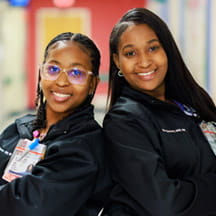Last year at this time, Children's Hospital Los Angeles moved Nurses Week celebrations to the fall, when we presumed things would be back to normal. What we didn't know then was how long this period would last, what would be required of us, and that our power to come through it would be found in our ability to collaborate.
As time went on, collaboration fueled new thinking about everyone's contributions, including nurses' contributions to each other, the nursing profession and the health care industry.
Signal solidarity
Like Steve Jobs and his legendary "uniform" of a black turtleneck and jeans, my clinical services leaders and I switched from wearing street clothes to showing up in scrubs every day.
It was practical, but it also signaled solidarity and an openness to collaboration with any team member at any time. For me, the choice ended up sticking. Even as the likelihood I would need to provide clinical care diminished, I kept wearing the scrubs.
Be visible
The leadership team provided continuous rounding support, talking to as many team members as possible, providing visibility, access and grounding. Most days we helped team members process the latest changes they had read about in their daily COVID-19 email update. It may have seemed small, but this was for us.
Decide what has future value
We learned that the collaboration we thought we were delivering for a short-lived crisis would need to be sustained. Doing so required resilience at levels that none of us knew would be needed.
Today I am asking my teams which of our collaborative approaches that were built on the fly during the crush of the pandemic's early days will remain. And I am asking myself which of my resilience mechanisms I need to maintain for the future.
Think beyond the hospital
Just as bridges of collaboration are being built within organizations, they are being built across the nation as well. National organizations are embracing nursing leaders and developing forums for nursing contributors in new ways—proof all of us are thinking and acting differently.
Inspire the next generation
This spirit of openness gave us the opportunity to take fresh approaches toward our work. One example that resonates for me is in the way that we onboarded 62 new nursing graduates in the middle of a pandemic.
It wasn't perfect, but we came together and thought differently about a program that was founded at our organization and steeped in history. But this timing permitted us to infuse our program with new thinking and reimagine how this could work for the benefit of the new graduates and the organization.
With new collaborators in place, we brought on these young and eager men and women and inspired them to—you guessed it—collaborate, and step into gaps. In just a few short months, some are even already leading.
Looking ahead with optimism
I know I am not the only nursing leader to have witnessed this transformation. I want to applaud my colleagues for staying the course, keeping the faith and not giving up. Nothing waited its turn this year.
There was no prioritizing one thing over another. There was no pacing of change. Everything we had to do was sudden, a juggling act, a turn on a thin dime. And the collaboration that came from it has been amazing.
Universally, we are all at the top of our game. It may have come in a way we did not wish to see, yet we have benefited greatly. And I encourage all of us to take our leadership to the next level.
As I consider the year ahead, one we all hope permits us to begin a steady journey toward normalcy, l, personally and professionally, hope we continue sustained collaboration that benefits our industry. Let's continue to innovate, engage people and demonstrate our appreciation. And let's keep collaborating so we all continue to support the best patient care outcomes.



